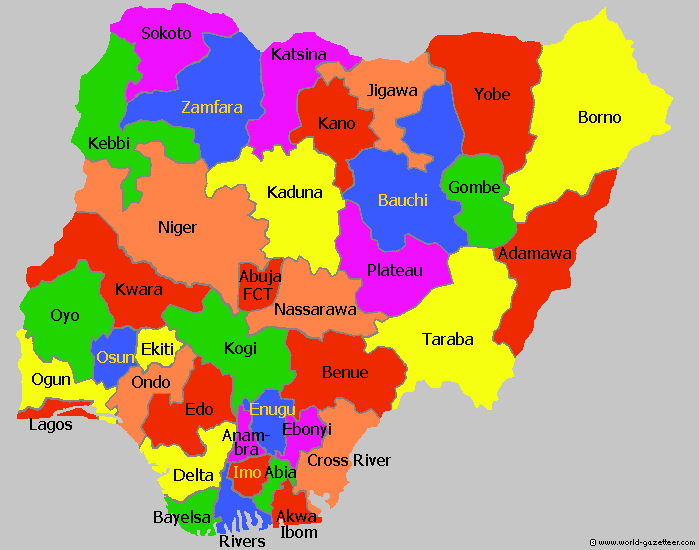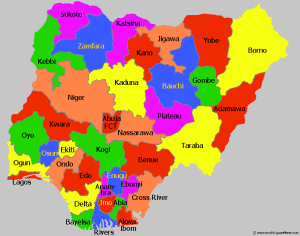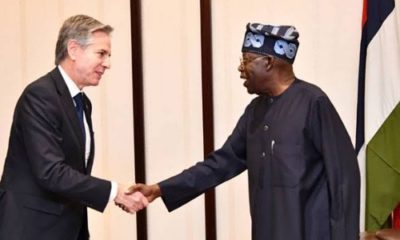Finance
Nigeria to emerge worlds 9th largest economy by 2050-PwC

By Yemie ADEOYE
LAGOS-NIGERIA, Africa’s largest economy may become the 9th largest global economy by the year 2050 according to a recent report from Pricewaterhouse Coopers a global leader in Accounting.
The Firm in its latest World in 2050 report presents economic growth projections for 32 of the largest economies in the world, accounting for around 84% of global GDP.
 It was projected that the world economy is to grow at an average of just over 3% per annum in the period 2014 – 50, doubling in size by 2037 and nearly tripling by 2050.
It was projected that the world economy is to grow at an average of just over 3% per annum in the period 2014 – 50, doubling in size by 2037 and nearly tripling by 2050.
“But we expect a slowdown in global growth after 2020, as the rate of expansion in China and some other major emerging economies moderates to a more sustainable long-term rate, and as working age population growth slows in many large economies.
The global economic power shift1 away from the established advanced economies in North America, Western Europe and Japan will continue over the next 35 years. China has already overtaken the US in 2014 to become the largest economy in purchasing power parity (PPP2) terms. In market exchange rate (MER) terms, we project China to overtake the US in 2028 despite its projected growth slowdown.
1 This is one of the five long-term megatrends that have been the focus of much recent PwC research, and is closely related to other key global trends related to demographic and social change, rapid urbanisation, technological breakthroughs, and resource scarcity and climate change. For more details of this megatrends research, please see our website here: http://www.pwc.co.uk/issues/megatrends/index.jhtml
2 PPP estimates adjust for price level differences across countries (see Appendix A for more details). They therefore provide a better measure of the volume of goods and services produced than GDP at current market exchange rates.
3 As discussed further in the recent PwC report on the future of India ‘The Winning Leap’: http://www.pwc.in/en_in/in/assets/pdfs/future-of-india/future-of-india-the-winning-leap.pdf. Potentially, Indian GDP could reach $10 trillion by 2035 if the right policies are pursued.
4 Our projections indicate potential growth if broadly growth-friendly policies are pursued by governments in these countries and if there are no major global catastrophes (e.g. global nuclear war, asteroid collision, long-lasting global pandemic). They are subject to many uncertainties as discussed in the scenario analysis in Section 3.4 of the report.
India has the potential to become the second largest economy in the world by 2050 in PPP terms (third in MER terms), although this requires a sustained programme of structural reforms3.
We project new emerging economies like Mexico and Indonesia to be larger than the UK and France by 2030 (in PPP terms) while Turkey could become larger than Italy. Nigeria and Vietnam could be the fast growing large economies over the period to 2050.
Colombia, Poland and Malaysia all possess great potential for sustainable long-term growth in the coming decades according to our country experts.
At the same time, recent experience has re-emphasised that relatively rapid growth is not guaranteed for emerging economies, as indicated by recent problems in Russia and Brazil, for example. It requires sustained and effective investment in infrastructure and improving political, economic, legal and social institutions. It also requires remaining open to the free flow of technology, ideas and talented people that are key drivers of economic catch-up growth.
We think that overdependence on natural resources could also impede long term growth in some countries (e.g. Russia, Nigeria and Saudi Arabia) unless they can diversify their economies.
This report updates our long-term global economic growth projections4, which were last published in January 2013. These are based on a model that takes account of projected trends in demographics, capital investment, education levels and technological progress. We have updated both the base year data (from 2011 to 2014) and The World in 2050
Future assumptions on the key drivers of growth, as well as expanding the coverage of the model from 24 to 32 countries (now accounting for around 84% of total world GDP at PPP exchange rates).
China is already the world’s biggest economy in PPP terms, and we project that India could have the potential to just overtake the US as the world’s second largest economy by 2050 in PPP terms (although the projected difference is small relative to the margin of uncertainty around any such projections).
We project that the gap between the three biggest economies (i.e. China, India and the US) and the rest of the world will widen over the next few decades. In 2014, the third biggest economy in PPP terms (India) is around 50% larger than the fourth biggest economy (Japan). In 2050, the third biggest economy in PPP terms (the US) is projected to be approximately 240% larger than the fourth biggest economy (Indonesia).
The rise of Indonesia and Nigeria through the world rankings throughout the period to 2050 is very striking: Indonesia rises from 9th in 2014 to 4th in 2050, and Nigeria rises from 20th in 2014 to 9th in 2050.
However, average income per capita (i.e. GDP per capita) will still be significantly higher in the advanced economies than the emerging economies in 2050. The current gap in income per capita between developing and developed countries is just too large to bridge fully over this period.
Banking
CBN Denies Currency Devaluation

The Central Bank of Nigeria (CBN) has refuted claims of devaluing the.
Earlier reports suggested that the CBN had devalued the Naira, lowering its exchange rate from N631 to the dollar, compared to the previous day’s rate of N461.60 at the Importers and Exporters (I&E) window.
However, the Central Bank of Nigeria (CBN) released a statement on Thursday through its Acting Head of Corporate Communications, Dr. Isa Abdulmumin, categorizing the report as false information.
In the statement titled ‘CBN Has Not Devalued The Naira’, he said the attention of the apex bank was drawn to the news report by an Abuja based newspaper edition of June 1, 2023, titled “CB Devalues Naira To 630/51”.
However, the CBN stated categorically that the news report was replete with outright FALSEHOODS and destabilizing innuendos, ‘reflecting potentially willful ignorance of the said medium as to the workings of the Nigerian Foreign Exchange Market.’
“For the avoidance of doubt, the exchange rate at the Investors’ & Exporters (I&E) window traded this morning (June 1, 2023) at N465/USS1 and has been stable around this rate for a while.
“The public is hereby advised to ignore the news report by Daily Trust in its entirety, as it is speculative and calculated at causing panic in the market,” the CBN spokesman added.
He, therefore, advised media practitioners to verify their facts from the Central Bank of Nigeria before publishing in order not to misinform the public.
Banking
BREAKING: CBN Increases Interest Rate By 0.5%

The interest rate in Nigeria has been raised to 18.5 percent, up by 0.5 percent, from 18 percent where it was pegged in March 2023.
The Central Banks of Nigeria’s (CBN) Monetary Policy Committee (MPC) resolved to this effect at its third meeting of 2023 in Abuja, on Wednesday.
Governor, CBN, Godwin Emefiele, made the disclosure in the communiqué of the MPC’s meeting, thereafter.
While engaging the media at the end of the two-day meeting, Emefiele, said the committee voted to keep the asymmetric corridor at +100 and -700 basis points around the MPR.
In the view of the MPC, rising inflation rate is traceable to the high energy cost and challenges around the supply chain, among others, which lie outside the corridors of the CBN.
Emefiele said, “The current trend in price development would continue to be monitored by the bank with greater collaboration with fiscal authority to address the drivers of inflation.”
Biztellers reports that the CBN had effected six consecutive interest rate increases, which has seen the rate move from 11.5 percent in March 2022 to 18.5 percent in May 2023.
Finance
Dangers Lurk As Nigerians Resort To Refurbished Gas Cylinders

In Nigeria, people have been forced to come up with creative solutions to cope with the effects of inflation and the economic crisis.
These improvised strategies have not only helped individuals save money, but also enabled them to stay afloat during difficult times.
In a concerning development, the recent trend of boycotting the high cost of cooking gas cylinders in Nigeria may pose a greater risk to lives than it does in terms of saving money.
Economy&Lifestyle investigations have revealed that the soaring prices of gas cylinders have reached a point where it has become increasingly challenging for average households to afford them, let alone refill them with gas.
The situation is further exacerbated by the fact that the pump price of kerosene, which would typically serve as an alternative, has become prohibitively expensive.
Upon investigation, it was found that the prices of gas cylinders vary depending on their sizes. A 3kg gas cylinder is priced at N14,000, while a 5kg cylinder costs N16,000. The larger cylinders are even more costly, with a 6kg cylinder priced at N17,000 and a 12.5kg cylinder costing N19,000.
Additionally, the expense continues when it comes to filling these cylinders with cooking gas, as it costs N2,600 for a 3kg cylinder, N5,200 for a 6kg cylinder, N8,950 for a 10.5kg cylinder, and N10,650 for a 12.5kg cylinder.
Consequently, an average household that needs to replace a worn-out 5kg cylinder would have to come up with N20,250 to purchase a new cylinder and fill it with gas, which can be a difficult feat to achieve.
As a result, many people have resorted to refurbishing their old cylinders and trying to use them as best as they can. However, this approach poses a significant danger.
Mrs. Rukayat Adesoji, a trader, shared her experience regarding her gas cylinder, which had become rusted and could no longer stand upright since last month. Due to the exorbitant prices of purchasing new cylinders, she resorted to seeking the assistance of a welder.
The welder patched the legs of the cylinder, repainted it, and ever since then, she has been using the refurbished cylinder for her cooking needs.
She said ““My gas cylinder which was 6kg got rusted and no longer stands erect since last month. When I asked for the price, I was told it was N17, 500. I was discussing it with a friend who advised me to take it to a welder to paint it and construct a new stand. I heeded to her advice and at the end spent just N3, 000 to turn my cooking gas to a brand new.”
Apart from refurbishing cylinders, some people don’t even know when their cylinders will expire. Mrs. Mercy Opara, a hair stylist, falls in that category as she explained: “I am taking my gas cylinder to the welder to spray it for me. It just cost N1, 500.
“The cost of buying a new cylinder is high. I have been using my cylinder for over 7 years and I don’t even know the expiry date. I just pray God blesses me so that I can buy a new one. But this one I am managing will look neat after spraying it for another two years.”
Mr. Adekanbi Joseph, a wielder, said he paints cylinder and “To paint and rebuild a cylinder stand, I charge N4, 500. Many people come here to paint as a new cylinder is now very expensive to get.”
Highlighting the potential dangers of using refurbished cylinders, Mr. Benjamin Hope, the Chief Executive Officer of FKT Cooking gas and general goods, emphasized the risks involved.
He stated that even a brand new cylinder can pose a risk of explosion if the locks are not properly secured after use or if the cylinder filled with gas is moved from one location to another.
He said “A brand new cylinder can explode if the locks are not well keyed after using and if the cylinder filled with gas was moved from one place.
“There are many reasons for the high cost of gas cylinders in Nigeria. One is the cost of importation due to the exchange rate. Another is the increased migration from the use of kerosene to cooking gas which has necessitated increased demand for gas cylinders. You know that in such a case there will be increased importation of cylinders.”he added














